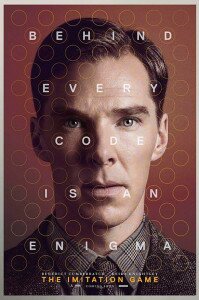 The Sloth wonders at what point the law was passed decreeing that B. Cumberbatch Esq and Ms. K Knightley should have first dibs on all eccentric loner and pouting vintage damsel roles respectively. For in The Imitation Game both are safely in their respective elements.
The Sloth wonders at what point the law was passed decreeing that B. Cumberbatch Esq and Ms. K Knightley should have first dibs on all eccentric loner and pouting vintage damsel roles respectively. For in The Imitation Game both are safely in their respective elements.
What do you think of when you hear ‘breaking the Enigma code’? We’re betting ‘Bletchley Park’ and ‘winning WW2’ spring immediately to mind, not ‘Alan Turing’ the mathematical genius who masterminded it. With the allied forces losing WW2 their only hope of victory was to break the supposedly unbreakable Enigma code that the German army used to send operational orders to its troops. Alan (Benedict Cumberbatch) was a Cambridge don recruited by MI6 as part of a team tasked with cracking the code.
Unfortunately, someone forgot to tell Alan there is no ‘i’ in ‘team’. His prickly, borderline autistic personality, fearsome intelligence and devastation at his only school friend dying at a young age isolated him from forming relationships. Fortunately fellow code cracker Joan Clarke (Keira Knightley) had the patience to see through his arrogant façade and help him relate to the others. Which was just as well as Alan’s code cracking vision was of essentially the first ever computer, a mechanical monster that systematically chewed through work at a rate no human could.
Part history lesson, part biographical study, this is a fascinating insight into a remarkable event that had unimaginably far reaching consequences – in both human lives and technological progression. We’d have liked a little more bare facts as to how Turing’s machine actually worked, but that’s a quibble and doubtless we wouldn’t have understood it anyway. Turing’s story, a man victim of gross prejudice despite his achievements, is often heart-breaking and Cumberbatch, as we have come to expect, does him full justice. Oh, and look out for the dashingly suave Mark Strong in a scene stealing role as a super-spook MI6 commander par excellence. Marvellous stuff.
UK release 14 November





